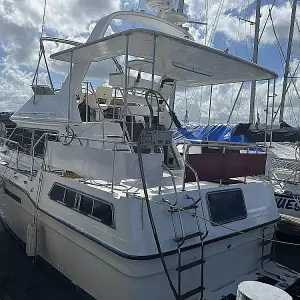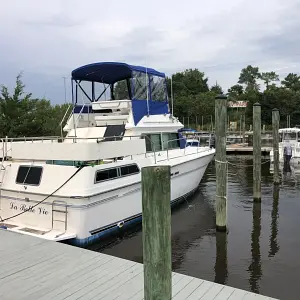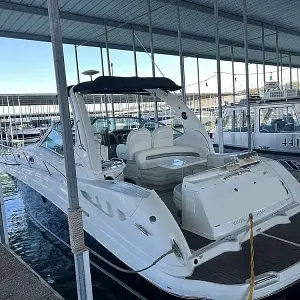

$595,000
OFFERED BY
Denison Yacht Sales
LOCATION
Norwalk, CT United States of America
YEAR
2022
LENGTH
35.99 ft.
Condition
Used
Year
2022
Make & Model
Sea Ray IV
Boat type
Power
Length
35.99 ft.
Location
Norwalk, CT United States of America
Beam
11.52 ft.
Draft
2.49 ft.
SEE THE SEA BLADE 36 AT THE NORWALK BOAT SHOW!!
Meet the future of hull design, now.
Built for the rough Hawaiian coastal waters, designed and finished for the true yachtsman.
The patented Sea Blade(tm) hull represents a breakthrough departure from conventional planing hull designs. Utilizing proprietary computational fluid dynamics (CFD) simulation tools and methods,
SEE THE SEA BLADE 36 AT THE NORWALK BOAT SHOW!!
Meet the future of hull design, now.
Built for the rough Hawaiian coastal waters, designed and finished for the true yachtsman.
The patented Sea Blade(tm) hull represents a breakthrough departure from conventional planing hull designs. Utilizing proprietary computational fluid dynamics (CFD) simulation tools and methods,
Sea Blade reinvented the planing hull with a combination of 0deg and 50deg ultra-high deadrise (UHD) panels to achieve significantly improved ride quality, comfort, and slam reduction without sacrificing efficiency.
Over the past ten years, Sea Blade hulls ranging from 16' to 42' have been built to withstand the fiercest conditions, and have been engaged since 2016 as the law enforcement patrol craft of choice for the State of Hawaii.
Design Ethos:
Offshore boats offering superior speed, seakeeping (ability to withstand rough seas) and sea kindliness (ability to maintain comfort in rough seas), in all loading conditions.
1. Seaworthy (fit and safe) at high speed in rough water.
2. Comfortable and stable at drift or idling in rough seas; increased metacentric height compared to a traditional monohull but less than that of a catamaran.
3. No bad habits: Stuffing, plunging, broaching, slamming, tripping, yawing, excessive spray, wave overtopping, excessive roll amplitudes especially in beam seas, off axis (heeled) hull landings, bow steering, or spin out in turns.
4. Superior competencies: stable low running trims, ease at transitioning hump speeds, reduced accelerations, navigating confused seas and breaking waves, seakeeping in quartering sea headings, course keeping/directional stability, payload overload handling
This 36 SeaBlade can be sold as is or with brand new engines of your choice, inquire with broker Mark Rossetti for more details
* Chartplotter: Garmin GPSMAP 8616
* Radar: Garmin GMR 18 HD+
* Autopilot: Garmin Reactor 40 Hydraulic Corepack with SmartPump v2
* VHF: Garmin VHF 215 with AIS
* Depth sounder Transducer: Airmar P319
The patented Sea Blade(tm) hull design is the outcome of over 20 years of advanced hull form research, which has resulted in over 25 U.S. Patents and advanced computer design, modeling, and simulation capabilities for hull forms. It is well known that high-speed planing-hull craft experience high acceleration forces that not only affect their performance and mission availability but, more critically, contribute to costly, long term, cumulative, and debilitating injuries to the warfighter, including boat operators, as well as fatigue, exhaustion and impaired fighting effectiveness of the combat troops underway on the boats. The Sea Blade hull was developed to address these limitations thereby improving mission effectiveness and reducing warfighter injuries.
The Sea Blade hull was invented in Honolulu, Hawaii by Steven Loui, owner of Pacific Marine & Supply Company, Ltd. and research and development subsidiary Hull Scientific Research, LLC. Over the past ten years, Sea Blade hulls ranging from 16' to 42' have been built in Hawaii, Rhode Island, Maine, New Zealand, and Australia, and have been engaged since 2016 as the law enforcement patrol craft of choice for the State of Hawaii's Department of Land and Natural Resources due to their superior performance in the challenging ocean conditions present throughout the Hawaiian Islands.
Hull Scientific Research has developed proprietary computational fluid dynamics (CFD) simulation methods to enable the efficient analysis of complex transient seakeeping dynamics to predict and refine the Sea Blade hull. Full-scale demonstrations of the hulls designed using CFD simulations confirm that these techniques can generate hull forms that provide a balance of high efficiency and improved ride quality in rough water. Extremely efficient planing lift is achieved in the patented hull design due to 0deg deadrise panels that progressively reduce immersion with speed. Running on wide chines on a slender center hull and spray compression in the entrapment tunnel significantly reduces drag. The 0deg deadrise panels are combined with ultra-high deadrise (UHD) panels with >=50deg deadrise for a hull that is neither too stiff like a traditional planing hull, nor too soft, like a deep-V hull, providing better ride quality and comfort with decreased slamming.
Sea Blade Design Ethos:
An offshore hull form offering superior speed, seakeeping (ability to withstand rough seas) and sea kindliness (ability to maintain comfort in rough seas), in all loading conditions.
1. Seaworthy (fit and safe) at high speed in rough water
2. Comfortable and stable at drift or idling in rough seas; increased metacentric height compared to a traditional monohull but less than that of a catamaran
3. No bad habits: Stuffing, plunging, broaching, slamming, tripping, yawing, excessive spray, wave overtopping, excessive roll amplitudes especially in beam seas, off axis (heeled) hull landings, bow steering, or spin out in turns
4. Superior competencies: stable low running trims, ease at transitioning hump speeds, reduced accelerations, navigating confused seas and breaking waves, seakeeping in quartering sea headings, course keeping/directional stability, payload overload handling, coming alongside another vessel in a seaway (VBSS).
Key Hull Design Features
1. Sharp entry angle, high cutaway bow rake with proud strakes optimizes progressive forebody penetration and cleaving the waves thereby mitigating spray, kiting, stuffing and bow steering.
2. Bow flare mitigates wave overtopping and plunging; spray is thrown outboard rather than up.
3. Longitudinal steps separate each running bottom panel; ultra-high deadrise (UHD) sides space the longitudinal steps vertically, effectively creating a high average deadrise hull with a keel-to-chine deadrise greater than 24 degrees.
a. The effective high deadrise hull created by the vertical stagger of the narrow hull panels softens reentry by increasing the added mass time constant as each hull panel plunges. The incremental loading of the panels from the keel to mid to outboard panels spreads the slamming force over a longer impulse, thereby reducing peak slamming pressures.
b. Longitudinal steps facilitate ventilation by trapping entrained air along the steps, running aft from the bow stagnation lines, reducing wetted area and viscous drag on the hull running bottom.
c. Steps and chines on each hull panel cleanly separates flow from lower to upper panels to reduce wetted area thereby mitigating viscous and spray drag.
d. UHD panels improve hull directional stability and grip in turns.
e. Longitudinal steps increase hull strength and stiffness due to a significant reduction in area of individual panels.
4. An entrapment tunnel is formed on the hull sides from the outboard panel longitudinal riser, tunnel ceiling panel and amas depending outboard on the ceiling.
a. At rest, the amas, including the tunnel ceiling, are submerged, providing added buoyancy and stability (both longitudinally and transversely).
b. When accelerating from rest, the tunnel ceiling provides additional planing surface area; the tunnel traps planing pressures aft to reduce bow rise and improve lift and acceleration to achieve critical planing speed.
c. As planing speed increases, the tunnel progressively ventilates from decreasing hull immersion until the ceiling is completely ventilated.
d. High speed flow running outboard and aft from the longitudinal step panels is trapped by the tunnels at the transom, partially sealing the tunnels; the ram effect of air entrapped by the partially sealed tunnel creates aerostatic pressure in the tunnels generating lift and increased ventilation to the transverse steps. This causes the unique benefit of entrapment tunnel craft being equally fast or faster upwind at high speeds.
e. As the craft heels and trims at speed, it causes high energy flows to impact the tunnel ceiling in the direction of the motion, thereby generating automatic pitch and roll stabilizing moments
5. Amas (sponsons) extending from the outboard side of the tunnel ceilings from forward of midship to the transom; progressively stiffen the hull both hydrodynamically and hydrostatically in pitch, roll and yaw.
a. Amas improve stability at drift and at speed.
b. Amas improve hull directional stability, especially in quartering or following seas for better course keeping and to mitigate broaching
c. Adjusting ama outboard spacing from the center hull as well as its buoyancy allows the for the tuning of the boat's metacentric height to optimize its natural roll periods.
d. Ama transverse separation from the main hull provides a structural standoff, protecting the main hull from collision impacts at the waterline thereby improving damage stability and survival.
ENGINE 1
Engine Manufacturer
Mercury
Max Speed Knots
52
Cruising Speed Knots
35
Tankage
1135
Engine Tankage
1135
HULL
Hull Material
fiberglass
Designer
Steven Loui
ACCOMMODATION
Toilet
Yes
OTHER
Displacement(kgs)
5896.0
Builder
Pacific Marine & Supply Company, Ltd.
The Sea Ray IV is 36 feet long and has a 12 feet beam. This Sea Ray IV is powered by Mercury and is capable of reaching a maximum speed of 52 knots and a cruising speed of 35 knots.. The Sea Ray IV is made of fiberglass.

LENGTH:
35.99 ft.
|
YEAR:
1984
LOCATION:
Jacksonville, Florida
OFFERED BY:
Pop Sells

LENGTH:
36.0 ft.
|
YEAR:
1987
LOCATION:
Beaufort
OFFERED BY:
Beaufort Yacht Sales

$139,000
LENGTH:
33.76 ft.
|
YEAR:
2006
LOCATION:
Portsmouth, Virginia
OFFERED BY:
United Yacht Sales

$139,900
LENGTH:
35.99 ft.
|
YEAR:
2009
LOCATION:
Miami,
OFFERED BY:
FYI Yachts

LENGTH:
35.99 ft.
|
YEAR:
2007
LOCATION:
Clearwater, Florida
OFFERED BY:
Pop Sells

LENGTH:
33.99 ft.
|
YEAR:
2006
LOCATION:
Austin, Texas
OFFERED BY:
Pop Sells